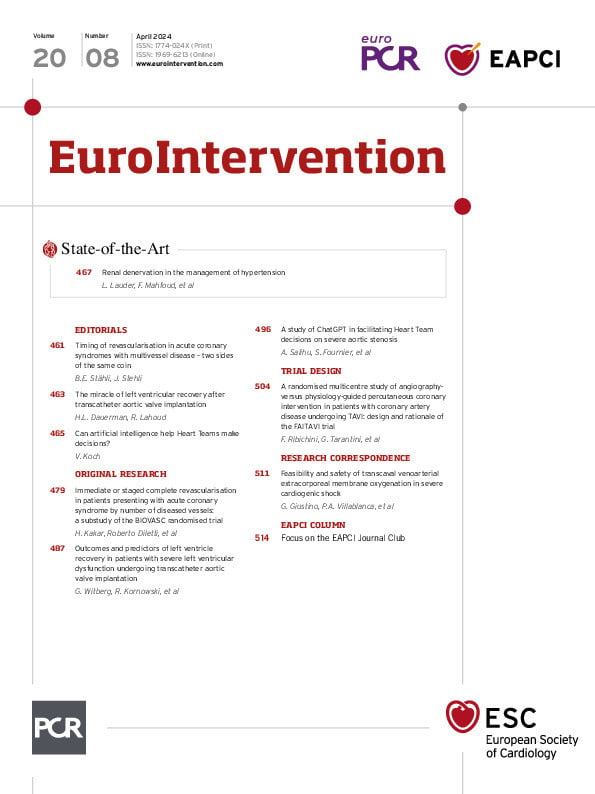About half of patients with ST-segment elevation myocardial infarction (STEMI) and two-thirds of patients with non-ST-segment elevation myocardial infarction (NSTEMI) present with multivessel coronary artery disease, and these patients are at high risk of adverse cardiovascular events1. In haemodynamically stable patients with acute coronary syndromes (ACS) and multivessel coronary artery disease, the benefits of complete revascularisation over culprit-lesion only percutaneous coronary intervention (PCI) have been demonstrated, and complete revascularisation is recommended by contemporary European Society of Cardiology (ESC) guidelines2345. Complete revascularisation in ACS patients can either be performed during the index procedure or as a staged intervention. The optimal timing of complete revascularisation in ACS patients has been recently investigated in two trials: the MULTIvessel Immediate Versus STAged RevaScularization in Acute Myocardial Infarction (MULTISTARS AMI) and the Direct Complete Versus Staged Complete Revascularization in Patients Presenting with Acute Coronary Syndrome and Multivessel Disease (BIOVASC) trials67. Both studies were designed to investigate whether immediate multivessel PCI (performed during the index procedure following primary PCI of the culprit lesion) was non-inferior to staged multivessel PCI (performed as a second procedure within 45 days)67. Both trials consistently demonstrated that immediate multivessel PCI was non-inferior to a staged approach with respect to a composite clinical endpoint at 1 year67.
With this prespecified analysis of the BIOVASC trial presented in the current issue of EuroIntervention, Kakar et al investigated whether the number of diseased vessels affects the efficacy and safety of an immediate versus staged multivessel PCI strategy8. This analysis is important, as immediate multivessel PCI may be particularly challenging in patients with extensive and complex three-vessel disease. In this study, the authors did not identify any interaction for the effect of an immediate or a staged multivessel PCI strategy on the primary endpoint − a composite of all-cause mortality, myocardial infarction, any unplanned ischaemia-driven revascularisation, or cerebrovascular events at 1 year8. The comparison between the two subgroups may, however, be limited by the rather small cohort of patients with three-vessel disease enrolled in the study (n=117 in the immediate multivessel PCI group and n=148 in the staged multivessel PCI group).
A few details of the study catch the interventionalist’s eye. The patients with three-vessel disease represent a complex cohort, of whom half presented with type C lesions. Furthermore, a broad range of ACS patients, including those with unstable angina, NSTEMI, and STEMI, were included in the study, resulting in a heterogenic patient population with diverse risk profiles. More intravascular imaging guidance was performed with staged procedures in both groups, and intravascular imaging needs to be encouraged in these complex patients in the acute setting. The amount of contrast agent used in patients undergoing immediate multivessel PCI did not differ between the two groups, However, half of the patients received 200 millilitres or more of contrast agent during a single procedure, which may increase the risk for acute kidney injury and volume overload.
Rates of the primary endpoint in the immediate and staged multivessel PCI groups were comparable in patients with two- and three-vessel disease, suggesting that operators and patients can decide on the optimal approach on an individual basis, irrespective of the number of diseased vessels. The increased risk of myocardial infarction observed with staged multivessel PCI in patients with three-vessel disease merits consideration. Immediate multivessel PCI might be of particular advantage in extensive three-vessel disease, as previous intracoronary imaging studies have shown that half of patients with STEMI and multivessel coronary artery disease have obstructive non-culprit lesions displaying vulnerable plaque features9, and these lesions may cause adverse events before staged revascularisation procedures are performed. Additionally, in patients with unstable angina or NSTEMI, accurate culprit lesion identification in multivessel coronary artery disease may be challenging, particularly when based on the coronary angiogram alone. Culprit lesions misinterpreted as non-culprits and left untreated during the index procedure may contribute to increased rates of adverse events during follow-up. Intracoronary imaging may therefore be useful in these patients, not only in terms of procedural guidance, but also for culprit lesion identification. Differences in the effects of immediate and staged multivessel PCI might have been alleviated when staged procedures were performed shortly after the index procedure. In the current study, the time intervals between the index and the staged procedures were 13 days for patients with two-vessel and 16 days for those with three-vessel disease. Trial designs using distinct time windows for staged multivessel PCI may be advantageous in this regard6.
In conclusion, this meaningful substudy of the BIOVASC trial suggests that an immediate multivessel PCI represents an effective and safe strategy for patients with multivessel disease, including those with complex three-vessel disease. However, future randomised trials are needed to confirm these findings. Given the large variety in patient characteristics, clinical presentations, lesion complexity, and healthcare resources, personalised concepts (timing of complete revascularisation, lesion assessment, and imaging guidance) are needed for patients presenting with ACS and multivessel coronary artery disease to achieve optimal outcomes.
Conflict of interest statement
B.E. Stähli discloses receiving grants to the institution from Edwards Lifesciences, Boston Scientific, the OPO Foundation and the Iten-Kohaut Foundation; speaker fees from Boston Scientific and Abbott; and serving as a steering committee member on the Cruz Senior Study. J. Stehli has no conflicts of interest to declare.

